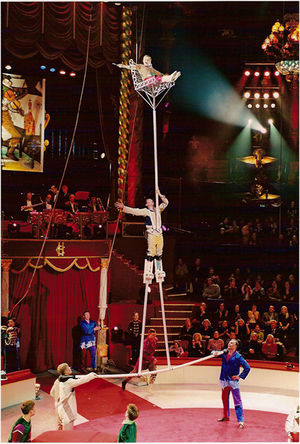Difference between revisions of "Kovgar Troupe"
From Circopedia
(→Teeterboard) |
(→See Also) |
||
| Line 16: | Line 16: | ||
==See Also== | ==See Also== | ||
| − | * Video: [[Kovgar_Video_(2002)|The Kovgar Troupe, teeterboard, at the Festival Mondial du Cirque de Demain in Paris (2002) | + | * Video: [[Kovgar_Video_(2002)|The Kovgar Troupe, teeterboard]], at the Festival Mondial du Cirque de Demain in Paris (2002) |
* Video: [[Kovgar_Troupe_BAC_2004_Video|The Kovgar Troupe, Teeterboard Act]], in the Big Apple Circus production of ''Picturesque'' (2004) | * Video: [[Kovgar_Troupe_BAC_2004_Video|The Kovgar Troupe, Teeterboard Act]], in the Big Apple Circus production of ''Picturesque'' (2004) | ||
* Video: [[Kovgar_Troupe_BAC_Video_2007|The Kovgar Troupe, Jump Rope Act]], in the Big Apple Circus production of ''Celebrate'' (2007) | * Video: [[Kovgar_Troupe_BAC_Video_2007|The Kovgar Troupe, Jump Rope Act]], in the Big Apple Circus production of ''Celebrate'' (2007) | ||
Revision as of 02:20, 3 February 2017
Teeterboard
By Dominique Jando
Born in Russia, Andrey Kovgar is a former gymnastics champion who, like many of his Russian counterparts, transitioned to the circus when his competition days were over. He learned his trade with the famous Russian teeterboardA seesaw made of wood, or fiberglass poles tied together, which is used to propel acrobats in the air. troupe of Viacheslav Chernevsky. It was as a member of the Chernevsky Troupe that he became the first acrobat ever to achieve, while standing on a single stilt, a triple somersault from the teeterboardA seesaw made of wood, or fiberglass poles tied together, which is used to propel acrobats in the air..
In 2000, at the Circus Nikulin Studio in Moscow, Kovgar created his own teeterboardA seesaw made of wood, or fiberglass poles tied together, which is used to propel acrobats in the air. troupe, bringing together various other former competition gymnasts, some of whom were Olympic medalists. The act, choreographed by Irina Voevodina, was originally called "Freilix." It immediately won a Golden Lion at the International Circus Festival of Wuqiao, China, in 2001.
When Dominique Mauclair selected the Kovgar Troupe to participate in the Festival Mondial du Cirque de Demain in Paris, he noted the Jewish musical atmosphere of the act and suggested they incorporate this theme into the act's visual elements. As a result, the costumes were redesigned in the style of Marc Chagall's paintings of old Russia's Jewish heritage, and the choreography was redone to add a distinctly Jewish tone.
The Kovgar Troupe's revamped teeterboardA seesaw made of wood, or fiberglass poles tied together, which is used to propel acrobats in the air. act was the revelation of the 2002 Festival Mondial du Cirque de Demain, where it won the Gold Medal. Two years later, it won a Silver Clown at the International Circus Festival of Monte-Carlo. Considered to be among the greatest teeterboardA seesaw made of wood, or fiberglass poles tied together, which is used to propel acrobats in the air. acts of all time, the Kovgat Troupe has appeared in some of the world's leading circuses, including Circus Knie in Switzerland, Circus Carré in Amsterdam, the Big Apple Circus in the United States, and of course, Circus Nikulin in Moscow. As a "second act," the Kovgar Troupe also presented a high-energy jump-rope act.
When Andrey Kovgar disbanded his troupe around 2010, it was reformed under the leadership of one of its members, Dmitry Sokolov, and became the Sokolov Troupe. The Sokolov troupe won a Gold Clown at the International Circus Festival of Monte Carlo in 2014.
See Also
- Video: The Kovgar Troupe, teeterboard, at the Festival Mondial du Cirque de Demain in Paris (2002)
- Video: The Kovgar Troupe, Teeterboard Act, in the Big Apple Circus production of Picturesque (2004)
- Video: The Kovgar Troupe, Jump Rope Act, in the Big Apple Circus production of Celebrate (2007)
- Video: The Kovgar Troupe, Teeterboard Act, in the Big Apple Circus production of Celebrate (2007)


